From The Chair
2021 may well embody the phrase “welcome to the new normal” although perhaps “Semper Gumby” (“ever flexible”) is even more appropriate. Teaching in the midst of a pandemic with shifting dynamics and requirements has made planning challenging to say the least. Classes returned to campus but with the provision to go remote if needed. Activities from meetingsto speaking events to conferences have gone remote and will probably stay there or at least with a remote version offered alongside in person meetings. This has brought an unanticipated benefit, people from across the country and across the world can log in to listen to our guest speakers live or click on a link to access a recording of the event. People can join in our activities without having to travel to campus or even travel to Kansas.
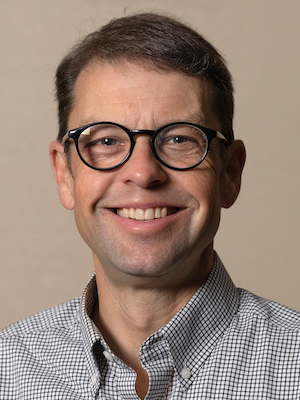
Life is returning to Fiske Hall, albeit with masks and distancing. For example, this year, we welcomed Rhenee Swink as student assistant to both History and Philosophy. You will probably notice an increase our social media presence as well as other activities thanks to her enthusiasm and energy.
We were delighted this year to welcome Dr. Alberto Wilson III to the faculty, who joins us as an assistant professor in Latinx History with an emphasis on urbanization along the U.S.-Mexico border. He also brings an interest in digital humanities and be sure to ask him about his study of the world of the luchador (those masked Mexican wrestlers we see in popular culture). Whether in person or remote, you can count on the Department of History, with its sister programs of Geography and Religion, to continue the work of teaching and scholarship, just in different forms. If you are on campus, look for the chalk sandwich boards outside advertising events…or treats…within. As always, check out our website of history.wichita.edu or our Facebook page: https://www.facebook.com/HistoryatWichitaState to learn more about what we are doing. Let’s keep in touch.
Local and Community History Program News
The turbulence of 2021 did not stop local historians at WSU. In fact, it gave us more opportunities. This spring, for example, Dee Harris led the museum studies class in their exhibit project at the Kansas Aviation Museum complete with masks and distancing. The Society of Public Historians continued its pandemic-inspired tradition of monthly zoom meetings that featured alumni speaking about their careers. Check us out at https://www.facebook.com/groups/135260029918293 for updates on future talks and links to previous ones. This fall, the society conducted its ever-popular community walking tour tradition with a look at the story of Riverside and an adult education class about museum practice called “Behind the Exhibit Case.” In addition, the society welcomed David Taggart, director of development at the Federal Hall National Memorial, to the Ulrich Art Museum to present “the American Ongoing Constitutional Experiment.” Check out history.wichita.edu to link to his talk.

This has definitely been a year of graduations and changes as our students and alums move on to new opportunities. Joshua Mackey, who had been curator at the Kansas Aviation Museum, finished his thesis on the Tulsa Race Massacre and then took a position as archivist at Oklahoma Baptist University. Filling Josh’s role at KAM is our own Logan Daugherty. Keith Wondra took a new position as curator of the collections and exhibits at Royal Gorge Regional Museum & History Center in Canon City, Colorado. Suzanne Walenta, curator at the Butler County History Center, has teamed up with alum filmmaker Ken Spurgeon to do a documentary series on the histories of communities in Butler County…and are now turning their attention to the story of Wichita and Sedgwick County. A reminder that local history prepares students for a wide range of careers, Abel Loza works as insurance agent in Garden City and Lisa Duran serves the medical needs of the Sisters of the Adorers of the Blood of Christ at Newman University. Dr. Ben Hruska deserves to be proud of his book Valor and Courage: The Story of the USS Block Island Escort Carriers in World War II. In another writing milestone, Sadonia Lane saw her chapter: “Balancing Act: Budgeting to Meet Your Office Needs” appear in You’re the Director: A Guide to Leadership in Student Financial Aid. Our students and alums are active in all sorts of areas. Kaysey Richardson is serving as marketing & events specialist at the Museum of World Treasures while Laura Hartley handles events at Newman University. Here on campus, look for Andrea Wilson at the Center for Economic Development and Business Research, Kathy Gale at LAS Advising, Bethany Kennedy at the Hugo Wall School of Public Affairs, and Erin LeBegue at the Honors College. Rhenee Swink, in addition to keeping the Society of Public Historians on track AND working on her thesis about women and photography AND serving as the student assistant for the departments of History and Philosophy is also helping First United Methodist put their archives in order. There is not enough space here to document all the students and alums doing teaching at all sorts of levels. Needless to say, there is a lot going on so make sure you are on the Facebook page or on the email list of director Jay Price to keep in the loop.
Announcement-Fairmount Folio
by Dr. Helen Hundley, Faculty Editor
After twenty-five years, the journal of student research is celebrating with two volumes of articles. The Fairmount Folio (founded 1996) has published nineteen volumes. The topics have ranged from Ancient History to Medieval Europe, to Colonial America, to the twenty-first century. Volume 20 will present articles from throughout the first nineteen volumes on topics ranging from throughout history. It will not have topics on Kansas, however. An additional volume, Kansas in the Fairmount Folio, includes a wide range of Kansas history. This Spring a formal presentation of the volumes will celebrate student research.
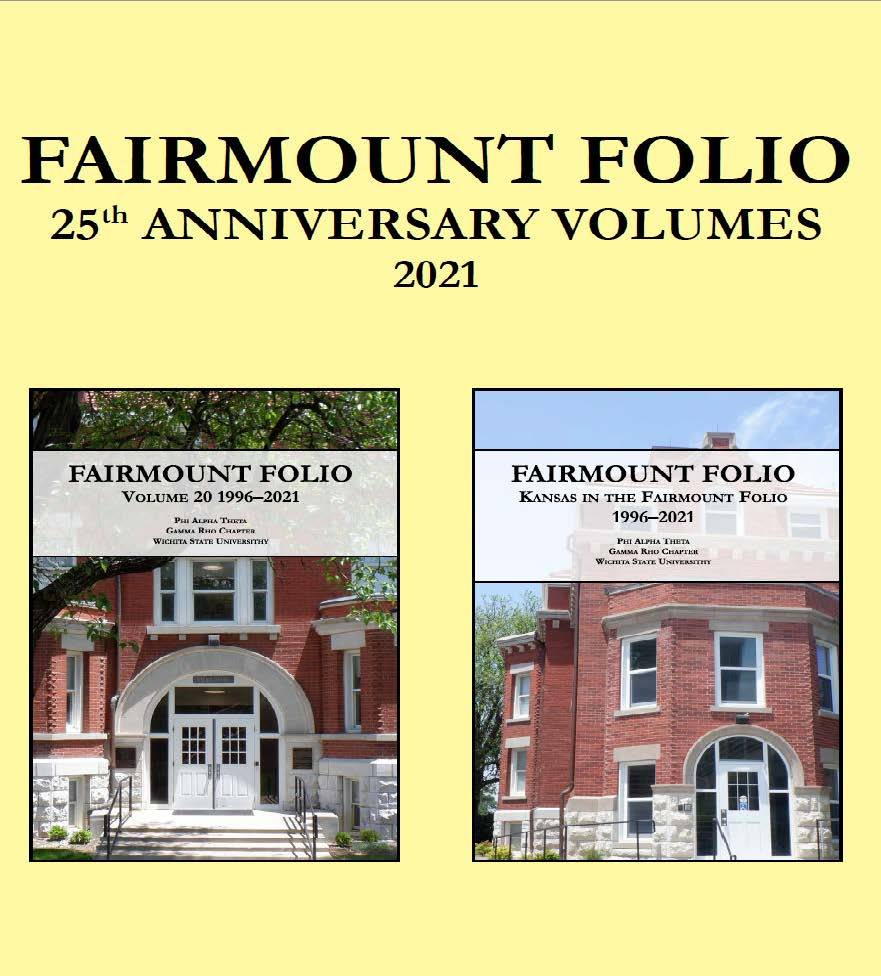
Faculty News
This past year was an eventful year for Laila Ballout. She has taken on the role of International Studies advisor in the History Department and looks forward to continuing to develop this valuable program for students. Although Covid kept many archives closed throughout 2020 and 2021, her article “Vanguard of the Religious Right: U.S. Evangelicals in Israeli-controlled Lebanon” was accepted for publication in the journal Diplomatic History and should be published in early 2022. She is hopeful that she’ll be able to get to some of the newly re-opened archives soon to help her continue writing her book about U.S. and Lebanese citizen activism during the Lebanese Civil War from 1975 to 1990.
She greatly enjoyed the many opportunities that she has had this past year to discuss immigration history and reflect on the twentieth anniversary of September 11th with communities in Wichita and beyond through Zoom conversations with KMUW’s Democracy on Tap, the Wichita Public Library, and Austin, TX NPR affiliate KMUT. Laila was thrilled to be able to return to phsyical classrooms for her fall classes and looks forward to more opportunities to get to know WSU’s campus and students.
2020 ended and 2021 ensued still mired in Covid-19 restrictions. But there were some bright notes nonetheless. George Dehner was part of a roundtable for the American Historical Association called “History and Historians Respond to Covid-19: Contagion and Containment” held in December. Attendees from around the world dialed in for the virtual (alas) event. Also in December, George’s wife Jodi was selected to receive the Employee of the Year Award from Standard Beverage for her work during the Covid crisis. The spring semester was marked by another round of effective, but unsatisfying, series of Zoom classes. Fortunately, by the fall, George was able to return to the classroom for in-person meetings. In addition to the usual slate of courses, George ran a Lifelong Learning course on the history of pandemics. While the majority of students attended remotely, it was still nice to see a smattering of students in person. Finally, after an improbably-long gestation, One Hundred Years of Pandemic Influenza was published by Taylor & Francis (2021). George has a chapter on the creation of the WHO Influenza Surveillance System in the book. As the fall semester winds down, George looks forward to a healthy and happy year for himself, his children (Brendan, Patrick, and Sean), his wife Jodi, and their dog Trooper.
Modern Europeanist John Dreifort continues to teach his full array of undergraduate and graduate level courses. He also continues to teach an adult education course for senior citizens every semester. Preparation for the constantly changing topics, historical and contemporary global affairs, keeps him busy burning the midnight oil. He appreciates the energy and challenge that the group brings to the discussion. While his research agenda has been frustrated by the COVID issues, he has not given up on the several projects that he has initiated. Hopefully the new year will bring new resolve. He continues to serve on several community boards. Having just completed his 50th year at WSU, he is persistently amazed at the great number of former students who he hears from or who he runs into in the Wichita community. He is gratified to see that they have done so well with their lives and careers. He wishes them good health and looks forward to hearing from them in the New Year.
The last year seemed like it would never end. In between never-ending administrative duties, a global pandemic, and having to listen to Dr. Dehner moan about the Flyers, Jeff Hayton is thankful that 2020-2021 has been consigned to the dust-bin of history (as have the Flyers’ playoff chances). Nonetheless, despite his lamentations about 2020-2021, this past year saw several very important developments for Jeff. First and most important, after again being delayed due to the pandemic, his book Culture from the Slums: Punk Rock in East and West Germany will be published by Oxford University Press in March 2022 (see cover). This is the culmination of a decade of work, and it is both a joy and a great relief to finally see the fruits of all this effort in print.
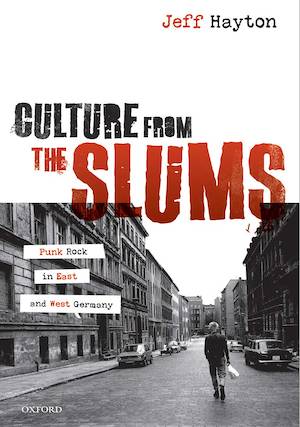
In addition to getting the book all finished, Jeff has written several other articles over the past year. The chapter “Shouting Back: Protest and Political Movements” appeared in a volume edited by Klaus Nathaus and Martin Rempe called Musicking in Twentieth-Century Europe (De Gruyter, 2020). He finished another chapter, “Mythic Ruptures: Krautrock and German Punk,” for a volume edited by Uwe Schütte called Krautrock: A Companion that will come with Cambridge in 2022. And he just submitted the article “Wutanfall: Emotional Entanglements of the East German Punk Subculture” for the journal Canadian Slavonic Papers/ Revue Canadienne des slavistes as part of a thematic issue on ‘The History of Emotions under Soviet and East European Communist Regimes.’ Finally, for the past year, Jeff has been working diligently with two colleagues to put together an edited volume called Socialist Subjectivities: Rethinking East Germany under Honecker that collects essays from a conference seminar they organized in late 2019. They have written the introduction, edited the submissions, and are just about to submit a proposal to the University of Michigan Press; hopefully it will come out in the next year or so. Perhaps the most exciting part of finishing his book is that he finally gets to start on a new one! For six months Jeff has been working on proposals to submit for grants to fund a sabbatical leave for next year in Germany. He is going to spend time in Berlin, Dresden, Leipzig, and Munich as he begins to research the very first study of mountain climbing in East Germany: Summits and Socialism: Mountaineering in the German Democratic Republic. Despite the storied tradition of German mountaineering, climbing is rarely associated with East Germany, or with socialism in general. Such absence, however, belies the importance of mountains and mountaineering to East Germans and the GDR. Exploring how East German climbers found ways to climb big walls and tall peaks under difficult political, social, and cultural circumstances, this new study will show how mountains and mountaineering were critical intersections of East German engagements with the natural world and illuminate the complex relations between state authorities and socialist citizens. After many years studying popular music, Jeff is incredibly excited to begin studying popular sport. And while he spends part of his sabbatical in Schwabing sipping his Milchkaffee, he hopes he also gets to spend a little time in the Alps as well.
During the 2020-2021 academic year, Dr. Robin Henry remained busy in her research, teaching, and academic and public presentations. Though delayed a bit by COVID-19, she will see two chapters and an article published in early 2022. Like many scholars, she had to find creative ways to conduct research without in-person access to archival materials. Luckily, she has found great librarians and historians willing to help scan materials from the special collections at UCLA. She has also participated in several research and writing workshops on the history of sexuality, law and gender, historical biography, and reformers in the Progressive Era. In Fall 2020, she finished her 6-part podcast series on the centennial of the 19th Amendment, “Hindsight: Looking Back at 100 Years of Women’s Suffrage,” which received two honorable mention awards from the Kansas Association of Broadcasters and was named a Top 10 history podcast by the Podcast Business Journal. Finally, she presented at the Western Historical Association’s annual meeting in October 2021 on teaching the disability rights movement as western history. Though COVID-19 has stalled her participation in several additional conferences, she looks forward to presenting new research in the coming years.
In addition to her research, Dr. Henry continued her work with the Law and Public Policy consortium in the Bill and Dorothy Cohen Honors College and is looking forward to teaching the first LGBTQ+ in US history course in Spring 2022. This has been a longtime project that closely connects to her research, and she is excited to share this field with students. In late 2020, she also became chair of the college committee tasked with redesigning the Department of Women’s Studies and Center for Women’s Studies. For this work, the Department of Women’s Studies selected her as the inaugural recipient of the Carol Konek Legacy Award. This award is named in honor of one of the department’s founding members and is awarded in recognition of significant con tributions made to the department and through community activism regarding women’s history and women’s rights. She also continues to organize the Department of History’s speaker series. Finally, Dr. Henry continues to write and deliver historical commentary for the series “Past and Present” on KMUW, and had the opportunity to interview Dorothy Wickenden, the executive editor of The New Yorker, about her new book, The Agitators: Three Friends Who Fought for Abolition and Women’s Rights for KMUW’s podcast, Marginalia.
Dr. Robert M. Owens enjoyed teaching both halves of the U.S. History survey, as well as Colonial America and the Age of Jefferson and Jackson. He reviewed manuscripts for Georgetown University Press, University of Alabama Press, and the University of Oklahoma Press. His ‘Indian Wars’ and the Struggle for Eastern North America, 1763-1842, a reader with primary source documents, was published by Routledge Press in 2020. On the research front, Owens is (hopefully) near completing his manuscript about murder and suicide on the early American frontier, despite the fact that if frequently bums him out. His latest article, “The Death of Captain Big Tree: Suicide and the Perils of US-Iroquois Diplomacy in the Early 1790s,” appears in The Pennsylvania Magazine of History and Biography, vol. CXLV no. 2 (April 2021), pp. 95-118. Dr. Owens will be on research sabbatical from January-July 2022, pursuing a new project concerning how the people of early America treated the bodies of their dead friends and foes.
Dr. Keith Pickus spent much of the past year creating and introducing three new courses. History Beyond the Headlines provides students the skills necessary to understand the historical context of contemporary events. Fact, Opinions and Why They Both Matter is a First Year seminar designed to help students engage in critical conversations about a range of topics, including ones that challenge students to better understand their perspectives and biases. And, The History of Genocide employs a theoretical and comparative approach to the phenomenon during the 20th and 21st centuries.
Keith’s essay, “Lessons From the Dark Side: How Being an Administrator Made Me a Better Teacher,” will appear in an upcoming edition of Inside Higher Education. In addition, Keith gave two public lectures; one on the historical origins of antisemitism and the other an over of how Auschwitz fits into the Nazi concentration camp system.
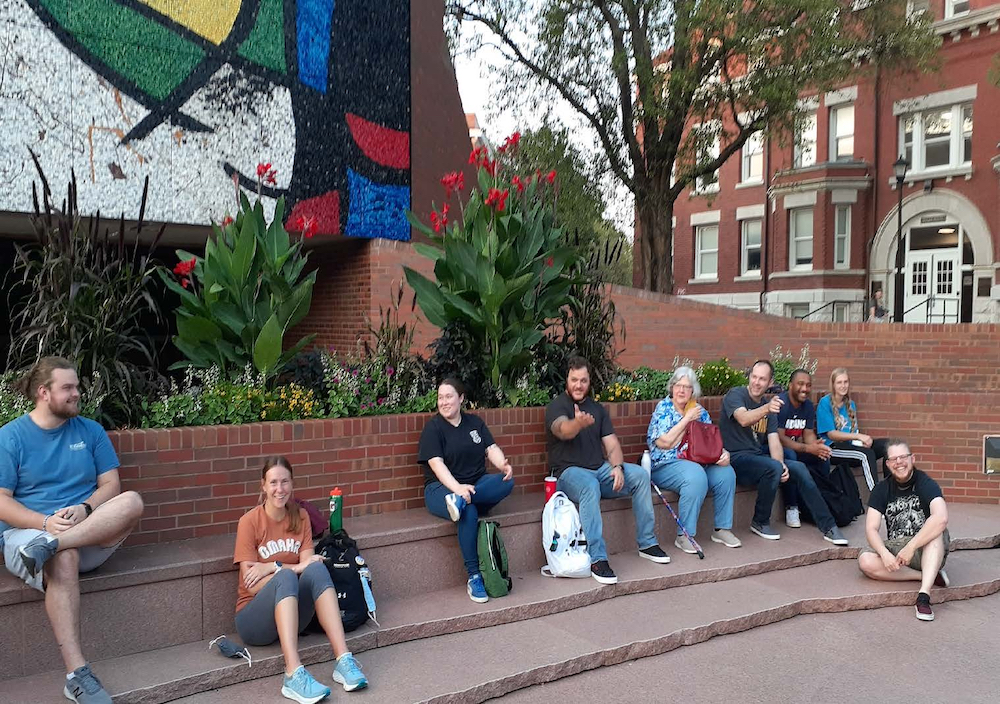
Many classes regularly met outside this year, including Dr. Price’s seminar class
Now in his fourth term as department chair, Jay M. Price has been spending 2021 trying to coordinate the ever-moving set of requirements for classes and activities with teaching, outreach and research. In his world, these different activities tend to overlap, most notably with the Somos de Wichita/We Are Wichitans project that he conducts with Dr. Enrique Navarro in Spanish and community leader Anita Mendoza. This year, the project was able to take its portable exhibit out to community events and to do a number of scanning sessions to collect the visual story of the North End of Wichita and in particular the Mexican American part of that story. To date, the team has collected over 500 images. This served as the basis for the photo history Mexican Americans of Wichita’s North End that the team produced during 2021 for a release early next year. In addition, he has continued to work with Dr. Weems and Dr. Sue Abdinnour on a series of ethnic entrepreneurship projects including a new oral history project of local ethnic entrepreneurs. Community events were a big part of Price’s efforts this year, including several…okay, perhaps too many…speaking engagements, several consulting projects, a number of documentary-related interviews, and writing the concluding piece “Remembering and Forgetting” for the Wichita-Sedgwick County Historical Museum’s new book, A Spell Created. Continuing an effort that began just before the onset of the pandemic, he continues to take Spanish classes and is now at the 300-level and so remains un estudiante y también un profesor. In 2022, he plans on bringing several writing projects to completion, taking the next level of Spanish classes, and hopefully setting aside more time for model trains (Santa Fe all the way!)
Rannfrid I. Lasine Thelle directs the Religion Program, housed here in the History Department. She teaches Religion classes, including Old and New Testament Introductory courses and topical courses. In the academic year 2020–2021 all classes were taught through Zoom, a challenge that brought a lot of learning experiences and opportunities for developing new skills. It was great to have this option during the hard first year of the pandemic; nevertheless, Rannfrid is very happy to be back in the classroom this past fall. This fall, students in Archaeology and the Bible capped off the semester with a poster display in the Ablah Library. In the spring of 2022 students can take a new class called Religion and Society, which Rannfrid will co-teach with our colleague in the Sociology department, Jodie Simon. An upper-level course called Women and the Bible is also on the slate for spring. Auditors are always welcome! As well, Lifelong Learners can take the course Discovering Babylon in April 2022, where students will have the chance to learn about Babylon as it has been passed down through historical memory as well as the excavations of the ancient city, the exhibits of ancient Babylonian cultures and Babylon’s impact on popular culture.
Rannfrid continues her work on the book called Babel and Bible. In this project, she explores the many ways in which the “discovery” of Mesopotamian cultures in the nineteenth century impacted the field of biblical studies. In the past year, Rannfrid worked with a German biblical scholar to adapt and translate her book Discovering Babylon into German. This book was recently published as Babylon entdecken, and she has heard from a colleague that the book will be used for a class this coming spring in Germany.
The pandemic year resulted in changes for the usual academic conferences. Instead of converting a special invited session at their annual meeting in November 2020 to the virtual format to which the conference was adapted, Rannfrid and her colleague Jeff Cooley (Boston College) decided to turn this session into a stand-alone two-day virtual conference. The conference was called Jehu’s Tribute: What Can Biblical Studies Offer Assyriology (https://www.bc.edu/bc-web/academics/sites/ila/events/Jehus-Tribute.html). Experts from the fields of Old Testament/Hebrew Bible and Assyriology and Ancient Near Eastern History applied different disciplinary perspectives to the question of the contribution of biblical studies to the study of ancient Mesopotamia, including intellectual history and museology, as well as religious and political history. Sponsored by Boston College’s Institute for the Liberal Arts, the conference took place in April 2021 with an expanded slate of invitees and respondents. Attendants joined in from all over the U.S., Europe, Israel, even East Asia and South Africa. Noting the keen interest that this conference sparked, Rannfrid and her colleague worked out a proposal for an edited volume on the same theme, and recently secured an advanced contract with Eisenbrauns, an imprint of Penn State University Press.
Robert E.Weems, Jr., Like other faculty members, Professor Weems had to adjust to a new instructional environment (teaching online courses). The experience he got during Spring 2020, during the initial COVID-19 shutdown, helped him tremendously during the 2021-2022 academic year. During Fall 2021, Weems taught History 509 (African American Historical Experience) and History 730 (Seminar in American History). During Spring 2022, he taught History 698 (Historiography) and History 132 (U.S. Since 1865).
Also, in terms of teaching, Professor Weems received approval for two new courses, History 327 “Ethnic Entrepreneurship” (which is cross-listed as Entrepreneurship 327); and a First Year Seminar, WSUA 102 AZ, ‘“We Shall Overcome” to ‘Black Lives Matter’: The Modern Black Freedom Movement.” In addition, Weems completed the paperwork to change History 509 (African American Historical Experience) into a 300-level course (History 309). This move should allow more students to gain access to this important information.
Professor Weems had an active research agenda during 2020- 2021. He, along with colleagues Jay Price (History) and Sue Abdinnour (Business Management), began analyzing data from an earlier survey administered to 155 nonwhite business owners in Wichita. Among other things, Weems will use this data (related to African Americans) as part of a larger article related to the history of African American entrepreneurship in Wichita. On a related note, the Weems, Price, and Abdinnour research team has been invited to participate in a Mellon Foundation-funded project, “Stories For All,” co-coordinated by the Hall Center for the Humanities and the Institute for Digital Research in the Humanities at the University of Kansas. Professors Weems, Price, and Abdinnour will receive $20,000, over three years, to work on an initiative entitled “Wichita Nonwhite Business Owners Tell Their Stories.”
Finally, Professor Weems gave a variety of virtual (Zoom) presentations during 2020-2021. During Black History Month 2021, Weems delivered a keynote lecture for WSU’s Office of Diversity and Inclusion entitled “Whatever Happened to ‘Black Capitalism’? The Decline of Public Discussions About African American Economic Development Since the 1960s.” Later in February, he provided an overview of African American business history to employees of the Hiscox Insurance Company. In April 2021, Professor Weems participated in an interview, sponsored by the Dole Institute at the University of Kansas, on the subject “Black Enterprise in the 60s: Policies that Shaped It, Kansans Who Built It.” Last, but not least, in June 2021, Professor Weems was a keynote participant in a virtual program sponsored by the regional banks of the U. S. Federal Reserve (“Racism and the Economy: Focus on Entrepreneurship”). Weems and Neel Kashkari, president of the Federal Reserve Bank of Minneapolis, discussed historic and contemporary instances of how racism has impeded theaspirations of African American entrepreneurs.
Alberto Wilson III joins the department as a Visiting Assistant Professor in Latinx History. He received his B.A. from Vassar College and a Ph.D. from the University of Houston, where he held fellowships from Fulbright and the Mellon Foundation that allowed him to spend two years researching and writing in Cd. Juárez, Chihuahua and El Paso, Texas. A specialist of the U.S.-Mexico border, Dr. Wilson’s is currently working on the early phases of his manuscript, Pan American Cities: Life and Society in El Paso and Ciudad Juárez, 1945-1994. This work offers a street-level view of the impact the rise of ‘maquiladoras’ had on border residents’ lives during the final third of the twentieth-century.
At WSU, Dr. Wilson looks to create courses in history of América that center the hemispheric exchange between the peoples of North and South America. Dr. Wilson will also take active part in the creation of a Latino Studies Program and he will also serve as the faculty liaison for the Shocker Adelante Scholars Program, a role he is excited for as a first-generation college graduate himself.
Thank you to our adjuncts:
- Dan Fullerton
- Dee Harris
- Leigh Jackson
- Kurt Sherry
- Beccy Tanner
- Dan Umansky
- Andrea Wilson
Student Awards 2020-2021
Year two of the pandemic again disrupted the classroom and cancelled the department’s spring luncheon, but despite these difficulties, a number of our undergraduate and graduate students continued to demonstrate superior academic merit. Through the generosity of our donors, the history department is able to reward these students with awards and scholarships. The continued excellent work of three students, Darbee Chard, Kay Doubrava, and Christen Brouillette was marked by the re-awarding of the Suellentrop Family Prize, the Russell “Jiggs” Nelson, and the Marie Graham Memorial Scholarships respectively.
In the undergraduate paper award categories, Darbee Chard’s paper was selected for the Douglas Bendell Award in Research and Writing and Justin Gordon’s submission was picked for the John Rydjord Jr. citation. Rhenee Clark Swink received the Phi Alpha Theta Kind Shepherd for her entry. In the graduate paper categories of the Fiske Hall Awards, Melissa Marinelli’s paper was selected for the Seminar Award and McKenna Paintin’s for the Non-Seminar paper award.
As usual, competition was fierce in the undergraduate scholarship category. William Taylor was recognized as the superior Sophomore history major with the Lee and Helen Kamen Scholarship and Niklas Erwin was tapped for the Donna and Bill Ard Endowed Scholarship. Claire Kelly continues her remarkable run with the Dr. Henry and Minnie Onsgard grant and Gladys Heitzman was chosen for the John Edward “Jed” Hurley Jr. award. Siofra Havel was named to the Decker-Kansas Society of DAR Award. This year marked a new scholarship for History 300 students with David Bounsana (Spring 2021) and Dani Matias (Fall 2021) nabbing the inaugural Virginia Mae Gardner Scholarship.
In the graduate award categories, Joshua Mackey’s stellar graduate career was capped with the John Rydjord Award. Melissa Marinelli received the Anthony and Dana Gythiel Endowed Scholarship/Fellowship for 2021. One area that has been very adversely impacted by the pandemic has been graduate research. With travel and access to archives and conferences curtailed, we had no applications for the Miner/Unrau Graduate Research Award or the William and Ruth Heaston PAT Gamma Rho Research Award. Hopefully, as things begin to open up again, our students will be able to avail themselves of this support in conducting and presenting their original research. The department is also pleased to announce a new award available for Phi Alpha Theta members—undergraduate and graduate—for the William and Ruth Heaston PAT Gamma Rho Chapter Student Support Fellowship. Please contact Jay Price or George Dehner for the details of this new award.
Many thanks again to our generous supporters without whom none of this would be possible, and congratulations again to all our winners. Best wishes for a healthy and happy 2022.
Alumni News
Breanne Sanford, B.A. ‘21; Has accepted a position at The Independence Daily Reporter in Independence, Kansas as a Staff Reporter.
Joshua D. Wright, B.A. ‘06, J.D. from University of Missouri-Kansas Cty School of Law ‘09. I’m currently an assistant district attorney for the Sedgwick County DA Office.
Scott Foens, B.A. ‘94, Published article in the Journal of Emergency Medical Services in 1996 on The Highway Safety Act of 1966. Completed MBA from Saint Ambrose University in 2004. Oversees information technology projects for the City of Cedar Rapids while also pursuing a Master of Arts in History from the University of Nebraska Kearney.
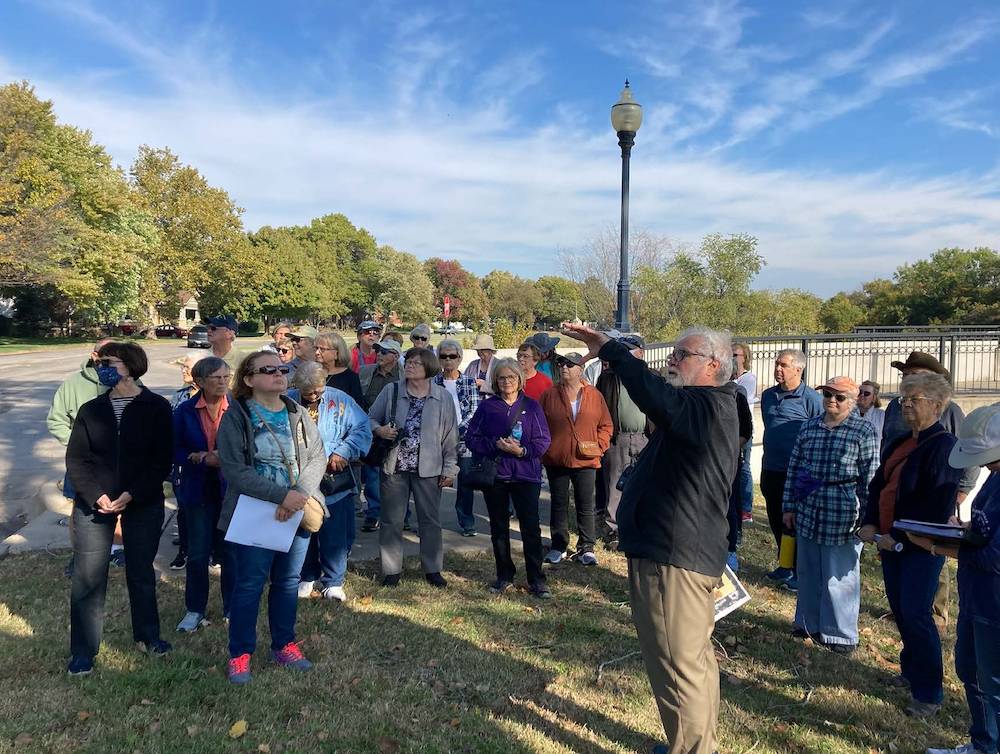
Walking Tour of Riverside in Wichita, featuring Dee Starkey.

